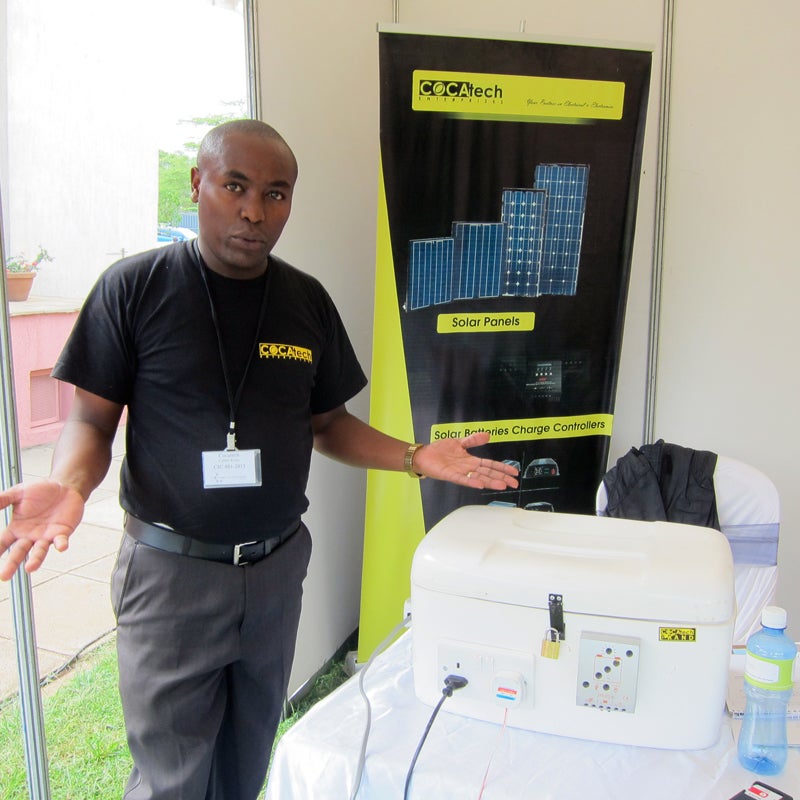A new global network of Climate Innovation Centers will support the most innovative private-sector solutions for climate change.
Pop quiz: What does an organic leather wallet have in common with a cookstove for making flatbread and a pile of recycled concrete?
Believe it or not, each of these represents something revolutionary: a private sector-driven approach to climate change. Each of these products – yes, even concrete – is produced by an innovative clean-tech company. And as of March 26th, those businesses, and hundreds more like them, have something else in common. They’re connected through infoDev's newly established global network of Climate Innovation Centers (CICs), an innovative project that is taking the idea of green innovation beyond borders.
Having piloted the CIC model in seven different countries – Kenya, South Africa, the Caribbean, Ethiopia, Morocco, Ghana and Vietnam – it was time for infoDev, a global entrepreneurship program in the World Bank Group’s Trade and Competitiveness Global Practice, to follow a time-honored business practice: to scale up and take this movement global.
And so, as part of last month’s South Africa Climate Innovation Conference, we joined forces with 14 experts from the seven different countries where the CICs operate to establish the foundations of the world’s first global network devoted to supporting green growth and clean-tech innovation.
CIC staff debate and discuss the new CIC Network during the South Africa Climate Innovation Conference.
This global network of Climate Innovation Centers – business incubators for small and medium-sized enterprises (SMEs) – has been designed to help local ventures take full advantage of the fast-growing clean-technology market. The infoDev study “Building Competitive Green Industries” estimates that over the next decade $6.4 trillion will be invested in clean technologies in developing countries. An even more promising fact is that, out of this amount, about $1.6 trillion represents future business opportunities for SMEs, which are important drivers of job creation and competitiveness in the clean-tech space.
To help developing economies unlock this potential, infoDev in 2012 adopted a novel approach to promoting green growth by establishing its first Climate Innovation Center in Kenya. The Kenya CIC has been recently voted ‘Most Promising Business Incubator in Africa' in the 2014 edition of the University Business Incubators Index, a Sweden-based global body that identifies top incubators around the world. After the Kenya CIC, six additional CICs have been developed around the world, over the past two years, to provide small clean-tech businesses with the training, financing and other resources they need to grow and thrive.
If building this multi-country platform to revolutionize the way we approach climate change sounds daunting – well, it is. But the potential payoff is big. Since the launch of the first center in Kenya, the CICs have helped hundreds of local clean-tech firms develop and commercialize new solutions to climate change. In Ethiopia, for example, Nyawira Gitaka has developed a unique cultivation technique that turns coffee waste into a potent eco-friendly fertilizer, while in Kenya, Collins Kayo is revolutionizing the local energy market by introducing a portable solar battery that can bring electricity to thousands of people outside the urban areas.
Collins Kayo and his Plug and Play Power Box
An important concept that emerged from this workshop on business incubation is the importance of keeping a local approach while thinking on a global scale. The most effective and profitable solutions to climate change appear to be linked to a deep and solid understanding of the local – and often unique – barriers to innovation and entrepreneurship. Once developed, these locally relevant solutions need to be linked to international partners and global expertise to grow and scale up.
Our 14 delegates, each of whom works in one of the seven CICs, had seen first-hand what were the main challenges of local entrepreneurs – from regulatory issues to funding constraints to lack of market information. By convening these representatives to share local challenges and to identify global opportunities, we were able to lay the foundations of a network that can support green growth at both the local and global levels.
The launch of the CICs Network, of course, was only the beginning: The work is far from over. This platform, however, has the potential not only to enhance our work with green businesses on the ground, but also to set a global example of an innovative approach to both economic and environmental challenges. That's good news for those stove makers, leather manufacturers and concrete entrepreneurs – as well as for the planet itself.




Join the Conversation